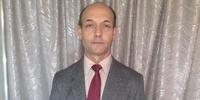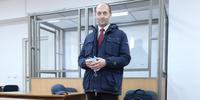The Case of Stashevskiy in Sevastopol
Filter
- #
Investigator of the FSB of Russia in the Republic of Crimea and the city of Sevastopol Andreev Y. A. initiates a criminal case for faith against Viktor Stashevskiy under Part 1 of Article 282.2. He is accused of "continuing the activities and promoting the ideas of Jehovah's Witnesses, holding meetings, and carrying out religious performances."
- #
FSB officers are conducting a series of searches in at least 9 houses of residents of Sevastopol. Believers are not provided with copies of the court order for the search, the protocol of interrogation, the search of the premises is carried out without the presence of the owners of the apartments or their movement is prohibited. Security forces use force against a 91-year-old woman, threaten others with planting drugs, blackmail relatives, damage or break personal property, and prevent them from drinking water or going to the toilet for four hours.
15 people, including Viktor Stashevskiy (born in 1966), become innocent victims of law enforcement officers. After the searches, he was detained and placed in a temporary detention facility.
- #
Viktor Stashevskiy was chosen as a preventive measure in the form of a written undertaking not to leave the place and released from custody.
- #
Another family of believers, Vladimir Petrovsky and his wife Victoria, is being searched. As a result, Vladimir was detained.
- #
FSB investigator F.A. Rybalka completes the investigation into the case of Viktor Stashevskiy and submits it to the court for consideration on the merits.
Stashevskiy is accused of allegedly "being the ideological inspirer of an extremist organization, using his authority, well-developed volitional qualities and organizational skills, as well as the special knowledge and propaganda skills he previously acquired, [...] deliberately took active organizational actions in order to continue the illegal activities of an extremist organization banned by the court."
- #
The meeting starts late and lasts about 45 minutes. The defense informs the court that the believer is being tried solely for his religious beliefs, which violates his constitutional rights. The defendant himself reports that the prosecution did not give him the opportunity to familiarize himself with the materials in full, for which the prosecutor receives a reprimand from the judge.
- #
The first hearing in the case of Viktor Stashevskiy is held in the Gagarinsky District Court of Sevastopol. The court admits the views of the UN Working Group, but rejects the request for video recording.
In connection with the refusal of the accused to provide the services of a lawyer due to financial difficulties, the judge decides to leave the public defender. The believer does not admit guilt.
Two prosecution witnesses are being questioned. The first, a former member of the local Christian religious organization (MHRO) of Jehovah's Witnesses, confirms that they were both members of it, but have not seen each other for more than three years. After the injunction, MHRO did not conduct any activity, since it was liquidated. The witness distinguishes between the concepts of a legal entity (MHRO) and a religious group (meeting), explaining that biblical texts and commentaries were never discussed at the meetings of the legal entity, chants were not sung, videos were not viewed, etc. The role of the MHRO was mainly limited to the conclusion of lease agreements for premises for major events. The participants of the MHRO satisfied their spiritual needs on their own.
The next to testify is the FSB officer, detective Dmitry Shevchenko. At first, he confirms that the Omega congregation of believers was not part of the MHRO, but then, realizing his mistake, he begins to give contradictory testimony. According to him, in addition to the founders, there are an unspecified number of "parishioners" and "elders" in the MHRO, and the parish of Jehovah's Witnesses, such as the Omega congregation, is not a religious group.
After that, the prosecutor and the judge begin to reject the questions of Stashevskiy and his lawyer under the pretext that they are in the nature of assumptions. After the end of the trial, the FSB officer began to intimidate those present, defiantly photographing them.
The next hearing is scheduled for June 30. The questioning of prosecution witnesses will continue.
- #
Contrary to the established procedure, Judge Valentin Norets begins the questioning of prosecution witnesses without giving the parties the opportunity to file motions.
Both interrogated witnesses, being former members of the MHRO (local Christian religious organization), say that after April 20, 2017 (the date of the decision of the Supreme Court of the Russian Federation on the liquidation of 396 legal entities, organizations of Jehovah's Witnesses), none of the legal entity, including Viktor Stashevsky, ever got together, the activities of the liquidated organization were not discussed or resumed.
Witnesses explain the significant difference between a legal entity and independent unregistered religious groups: "MHRO was engaged exclusively in economic and legal activities, primarily for the maintenance of its worship building, as well as for the conclusion of lease agreements for large premises [...] There were no chanting, Bible readings, religious literature studies, or videos at the MHRO meetings."
Once again, the established procedure of the trial is violated. Despite the fact that all prosecution witnesses must be questioned first, the judge calls defense witnesses. (On the part of the prosecution, the secret witness "Ivanova Vasilisa Ivanovna" and witness D. B. Korkushko, who allegedly attended services of Jehovah's Witnesses until 2017, remain unquestioned.) Two defense witnesses give a positive characterization of the defendant.
Viktor Stashevskiy is trying to exercise his right to file petitions. Judge Norets rejects his requests for video recording of the hearing, for the defendant's attitude to be included in the charge, as well as for the production of an audio copy of the previous hearing.
The next hearing is scheduled for July 21, 2020.
- #
In Sevastopol, since 6 a.m., security forces in camouflage have been invading the homes of believers at three addresses, searches are being conducted. Two men are taken away for interrogation to the department of one of the local law enforcement agencies. It is not yet known whether the special events are related to the case against Viktor Stashevskiy.
- #
In the Gagarinsky District Court of Sevastopol, in connection with the change of judge in the case, hearings begin anew. (Judge Valentin Norets resigned, Pavel Kryllo was appointed the new judge.) The prosecutor announces the essence of the charge. Judge Kryllo interrogates a witness for the prosecution, an employee of the Sevastopol FSB, detective Dmitry Shevchenko.
The court attaches to the case documents confirming that the 85-year-old mother of Viktor Stashevskiy needs constant care, which only her son can provide her.
- #
Another court hearing in the case of Viktor Stashevskiy. The appointed lawyer of the defendant is absent due to participation in the appeal in the Supreme Court of Crimea. The believer's defense is represented by another lawyer appointed the night before.
The court hears the testimony of the specialist Panischev and the witness on the part of the defense.
- #
Judge Pavel Kryllo unexpectedly declares that on March 16 the court may proceed to the debate of the parties. Thus, the judge ignores the stage of examination of the case materials.
- #
Participants in the trial consider material evidence — audio recordings of religious meetings. The next meeting, which is scheduled for March 22, will also be devoted to the consideration of material evidence.
- #
The prosecution is requesting 7 years of imprisonment in a general regime colony for Viktor Stashevskiy. On March 29, 2021, the believer will deliver his last word in court, and the court will pronounce a sentence on him.
- #
- #
The Gagarinsky District Court of Sevastopol sentences Viktor Stashevskiy to six and a half years in a general regime colony. The believer is taken into custody.
The last word of the defendant Viktor Stashevskiy in Sevastopol - #
The lawyer visits Viktor Stashevskiy in the pre-trial detention center. Viktor is being held in a 16-bed cell. He does not complain about his health, he is allowed daily walks. On April 24, he was given a copy of the Bible, but he has not yet received it. The believer regularly receives letters of support.
- #
The Sevastopol City Court rejects Viktor Stashevskiy's appeal. The verdict comes into force.
- #
From pre-trial detention center No. 1 in the Republic of Crimea and Sevastopol, Viktor Stashevskiy is transferred to one of the institutions of the Federal Penitentiary Service of the Volgograd Region. Which one is still unknown.
- #
It becomes known that Viktor Stashevskiy arrived at correctional colony No. 9, located at the address: Krasnodar Territory, Absheron district, Khadyzhensk, Griboyedov str., 42. He can write letters.
- #
The lawyer visits Viktor Stashevskiy in the colony. He learns that upon arrival, the believer was sent to quarantine, and later to a punishment cell (SHIZO). Stashevsky says that he sleeps on the floor on a mattress, as he cannot sleep on a folding bed. His underwear was stolen and his pillow was torn. In the punishment cell, he is fed porridge and crushed potatoes. The administration explains the placement in the punishment cell by a serious category of the article, and not by violations on the part of Viktor.
He has not yet received a single letter in the Khadyzhen colony, and he cannot write to anyone due to the lack of stamps and envelopes. He rereads the letters he received in the Crimean pre-trial detention center and finds joy in them and in reading the Bible.
Victor suffers from high blood pressure and needs medication. In addition, he worries about his mother, who remained in the Crimea (she recently suffered a stroke and a severe fracture), and for his wife, who faced new difficulties.
- #
It becomes known that for another "violation" - the absence of a tag on a sweater - Viktor Stashevsky was placed in a high-security barracks for 1 month. There, the prisoners are under lock and key, in fact, it is a prison within a colony. The size of the chamber is 1.5 by 2.2 meters, rising at 4:40 in the morning.
Since Victor has a good relationship with his cellmates, they provided him with everything he needed before being placed in the BUR. It turned out that some of them had previously known Jehovah's Witnesses.
The believer has a non-conflict relationship with the administration of the colony. However, this did not prevent them from tightening the regime of detention of Stashevsky. It also becomes known about an unspoken order - those convicted under an extremist article in the Krasnodar Territory are to be treated strictly by default and regardless of the grounds.
- #
Stashevskiy was sentenced to 6 months of detention in a single cell-type room (EPKT).
Viktor Stashevskiy is taken without warning to correctional colony No. 6 in the Krasnodar Territory, located in the village of Dvubratsky. It is very cold in the cell where the believer is placed. Stashevsky is forced to go for walks in slippers, since all his belongings and documents remained in the former colony. His Zonatelecom card was blocked at the new location, so he does not have the opportunity to call his relatives.
Upon arrival at the EPKT, the Bible was seized from Stashevsky for verification. However, even when he was sent to colony No. 6, he received 40 letters sent by fellow believers from Russia, Kazakhstan, America, Europe and even Madagascar. They serve as a great encouragement to Victor. More than a hundred other letters were not given to him because of the mention of the name of God in them, although this is not prohibited.
As a result of the tightening of conditions, Stashevsky has the right to only one short-term visit and receive one transfer in six months.
- #
The lawyer who visited Stashevsky reports that the believer does not complain about his health: he does exercises and breathing exercises, and also maintains a positive attitude.
Viktor tells his lawyer that he was placed in a transit cell during his transfer to Colony No. 6 in Krasnodar. There he met Vasily Meleshko.
- #
The lawyer visits Stashevsky in the colony. The believer does not complain about his health. However, he recently had an acute respiratory viral infection: in the medical unit he was given bed rest, prescribed and given the necessary medications.
Stashevsky does not lose optimism, not the least role in this is played by the ability to receive correspondence. To the surprise of the colony staff, more than 500 letters have already been sent to the believer in 4 months.
The prisoners treat Victor with respect.
- #
Viktor Stashevskiy is in pre-trial detention center No. 1 in the Krasnodar Territory in the process of being transferred to another colony.
- #
Viktor Stashevskiy is again taken to correctional colony No. 9 in the Krasnodar Territory, located in the city of Khadyzhensk.
- #
Viktor Stashevskiy has been held in strict conditions of detention in Penal Colony No. 9 in Khadyzhensk for some time now. For unknown reasons, the believer is not allowed to use either a shopping account or the right to make phone calls. He was also not allowed a long visit with his family.
Letters are issued only partially. All Bible quotations and the name "Jehovah" are crossed out in them. The believer says that difficulties arose in receiving the parcels due to the fact that the colony indicates incorrect information about the recipient of the parcel.
- #
Viktor Stashevskiy is put in a PKT (chamber-type room), where he will stay alone until at least March 20. "The suffering we go through is temporary," says Victor of his attitude towards these circumstances. "Therefore, it is important to continue to hold our loving God's hand tightly."
- #
Viktor is held in strict conditions of detention. He maintains a positive attitude. The state of health is satisfactory, but a visit to a private dentist is required, since the colony does not provide the necessary treatment. The believer wrote an application for transfer to Kerch (Crimea), closer to his place of residence, but was refused.
- #
It becomes known that Victor is once again isolated in a single chamber-type room.
- #
Viktor Stashevskiy is still in strict conditions of detention in Penal Colony No. 9 in the city of Khadyzhensk. Together with him, there are 21 more people in the room.
The believer is allowed to walk for an hour and a half a day. Victor has the opportunity to read the Bible. He is supported by letters from caring people, but the administration of the colony has set a limit on sending correspondence - 7 letters per week.
- #
- #
- #
Viktor Stashevskiy was transferred from the Khodyzhensk colony to Prison No. 2 in Vladimir, which was called "Vladimir Central".
- #
Victor is kept alone in a double cell. He needs dental treatment. The prison administration and inmates treat him with respect. The believer is strengthened by regular letters of support and reading the Bible that he borrowed from the library.
- #
Viktor finally received dental care, he was also given vitamins and a blood pressure monitor, he regularly receives the necessary medications. He visits the store once a month. He is not working yet, but he has applied for the vacancy of an assembler of electrical accessories.
The believer regularly receives letters, and a long meeting with his wife is expected in May.
- #
Viktor is being held in solitary confinement in a cell of 10 square meters. He jokes: "The food is good, you won't gain weight." Since November 2024, he has not been allowed out for walks. He looks after his health, exercises; he takes medication for hypertension, but again needs dental care.
Viktor applies every month for a visit from his wife, but does not receive a reply. The believer tries to answer letters, but, according to him, the administration does not send them out due the absence of a censor. The staff of the institution treat Stashevsky with respect. Love of life and reading the Bible help him cope with the restrictions.
- #
Stashevsky received a long-awaited meeting with his wife, but other requests - for the issuance of the necessary medicines and hygiene products - remain unanswered. The issue of dental treatment has not yet been fully resolved.
Viktor almost never leaves the cell. His connection with the outside world is maintained by letters that strengthen him and create a sense of live communication. Viktor had a cellmate, with whom the believer developed good-neighborly relations.




